Fiona Duţu din Londra, directoarea unei şcoli de limba engleză din Bucureşti, stabilită de 16 ani în România
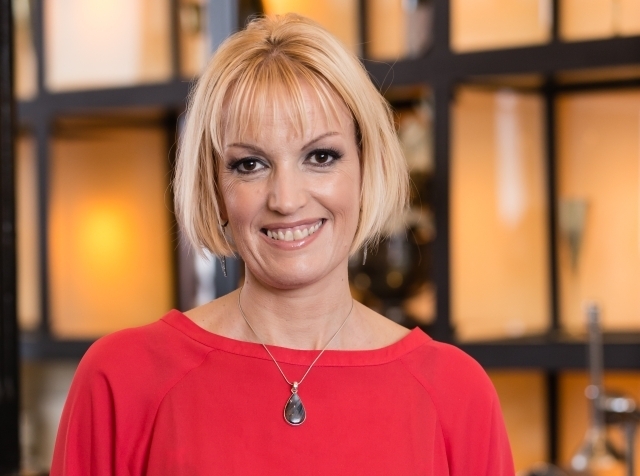
Fiona Duţu din Londra, directoarea unei şcoli de limba engleză din Bucureşti, stabilită de 16 ani în România
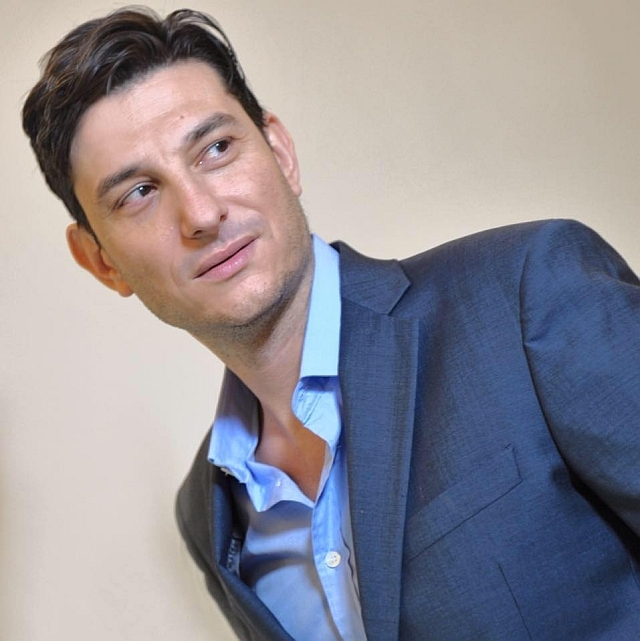
Konstantinos Diamantopoulos din Atena, de 16 ani în România.
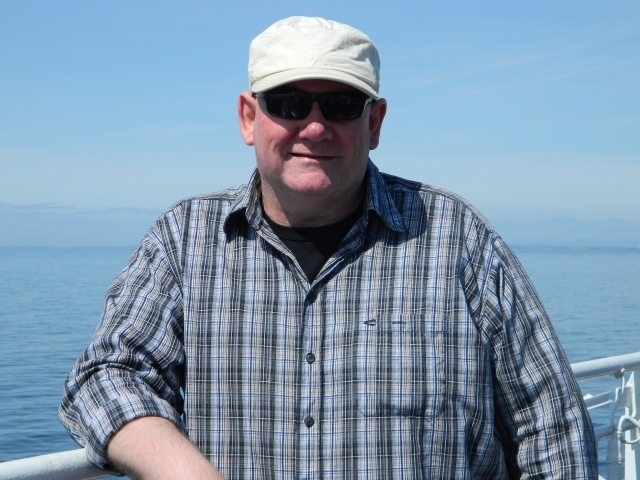
Mike Waters, profesor de limba engleză, sosit din Irlanda şi stabilit în România în urmă cu 6 ani.
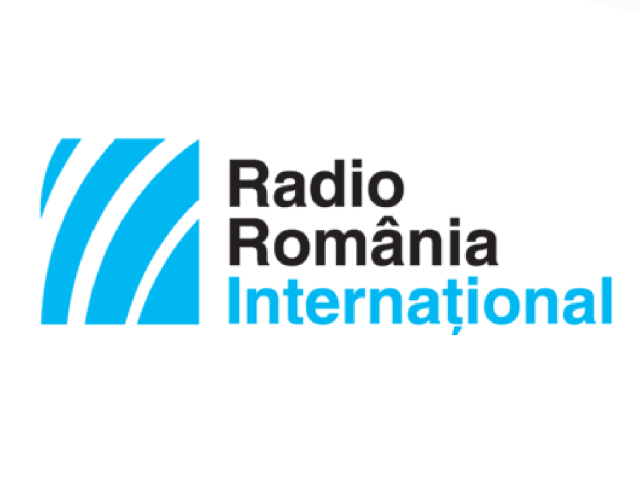
Mohammed Gaghman din Yemen, student la Universitatea Politehnică Bucureşti, Facultatea Automatică şi Calculatoare.

Atalia Weissman, şefa Catedrei de ebraică de la Complexul Educaţional Lauder-Reut.
Monika Zaczek din Polonia, profesoară de engleză şi responsabil pe probleme de training şi dezvoltare la British Council.
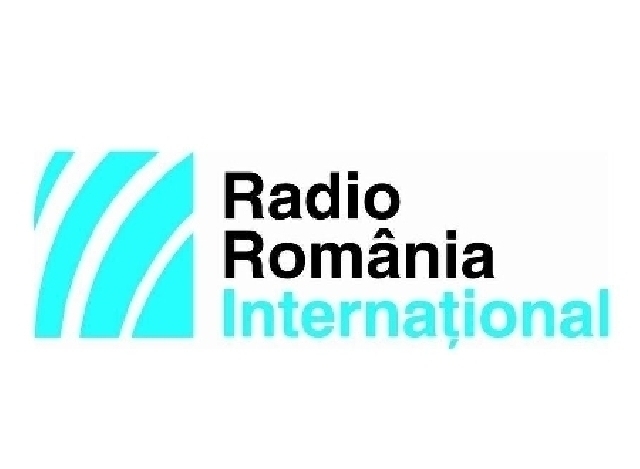
Youcef Kadri is a young Algerian passionate about IT&C. He speaks fluently several widely-circulated languages and is currently working for a call center in Bucharest. We asked Youcef Kadri how his Romanian experience started: “I am a team manager in a call center in Bucharest. I did my studies back in my home country, Algeria, where I focused on hardware maintenance. I came to Romania after I tuned 18. Romania was the first country I ever visited and it so happened that I fell in love with it right away. I remember it was in winter and I was traveling to Orşova. I was so amazed by the landscapes. I really enjoyed the sight of what I saw. I couldn’t believe that I had reached Romania!”
Youcef starts work very early in the morning and is very busy during the day: “I wake up at 5 a.m. and sometimes at 6 a.m. At 7 I go to the pool for a swim. I work until 6 p.m. Then I go home where I cook and clean the house. At my work place I have managed to adapt quite well, there is no big difference between the atmosphere here in Romania and that in Algeria, because I work with very young people. We get along very well. We make jokes, at the weekend we go out together as a team and each Saturday we play football”.
We asked Youcef about his favorite place in Bucharest and what other cities of Romania he has visited so far: “I like Bucharest as a whole, but my favourite location is the Cişmigiu park. I have been to other parks as well but Cişmigiu has something special. I would like to revisit the park in Craiova which I heard has been refurbished. Each park has a positive impact on the body and the soul. Of course, each park is different and what matters most is the time when you visit it. Bucharest is a green city as compared to other cities from abroad. I have been almost everywhere in Romania, I have seen the mountains and the Black Sea Coast.”
Besides his passion for sports like swimming, diving or snorkeling and football, Yousef is also interested in gastronomy. He cooks Algerian dishes as well as Romanian dishes: “I like to cook. Romanian sour soup is not that different from what we have in Algeria. And we also cook polenta. Almost all the traditional Romanian cuisine is similar to the Algerian one. The ingredients may be different but they are combined in almost the same manner. Especially the polenta, the cabbage rolls and the sour soup”.
Youcef Kadri has also shared with us his impressions on his interaction with young Romanians: “We respect each other. In general, interaction is influenced by each individual’s personality. Wherever you go, you will find both good and bad people. I have noticed that the Romanian young people speak fluently several foreign languages, which I really appreciate. They are active people. The people I have met have received me very well in Romania. Of course, in the beginning it was a little harder, as I was coming from a different continent. People didn’t know much about Algeria, they thought it was located somewhere in the desert. Later, when they had come to know me better and had become aware of the principles that guided my life, we started to get along very well.”
Youcef Kadri is still in love with Romania and never misses a chance to talk to everyone about the pleasant experience he has had over the past years in Bucharest. (translation by Lacramioara Simion)

At 23 El Shaiah Hodor decided to leave his native country for a better life in Germany, and his ways brought him to Romania where he took the name of Doru. He only intended to transit Romania, but what he discovered in this country made him remain.
El Shaiah Hodor: “Back in the 1990s I was transiting Romania, I had a 48 hour visa, as I was heading for Germany. I liked Romanians, I liked the country and so I decided to stay in Romania. I have been living in Romania for 27 years. I made friends very quickly because many people were speaking French. I am a Lebanese and, as you may know, French is like the second mother tongue for many Lebanese people. I lived in a building near the Academy of Economic Studies and so I made friends with many students studying economics. I liked the people very much and so I decided to stay and live in Romania.”
He learnt Romanian quite easily as his friends helped him a lot. In the beginning he managed to obtain a 6-month visa on condition he made proof of the fact that he could provide for himself. Then he started a family.
El Shaiah Hodor: “In 1993 I met my future wife. We got married, we have children, we have a house, land and animals. We have everything we wanted. I have my own business. I like Romanian people. Here I have more friends than I ever had back in Lebanon.”
In Lebanon he used to work in constructions, but, like in many Asian countries, Doru could cut and style hair, so he opened his own hairdresser’s salon.
We asked Doru how he adapted to the Romanian cuisine and which his favorite dishes are: “I like the Romanian bulz, a dish consisting of polenta, cheese, home-made sour cream and a fried egg. I do not eat pork but I like stuffed vine leaves with minced beef or mutton. I also like the Romanian sour soups. I generally add more spices, because that’s how we eat in Lebanon, we usually add many spices and condiments.”
Despite the fact that he feels at home in Romania, he has his family and friends, Doru has one regret: “At present, after 27 years of living in Romania, I still don’t have Romanian citizenship. I have been married for 21 years, my children have now grown. This is my biggest regret, given that some time in the future I will have a Romanian grandson or granddaughter, but I do not have Romanian citizenship.”
Nevertheless, El Shaiah Hodor or Doru, by his Romanian name, feels he is a Romanian citizen and not many people could guess his origin. (translation by Lacramioara Simion)
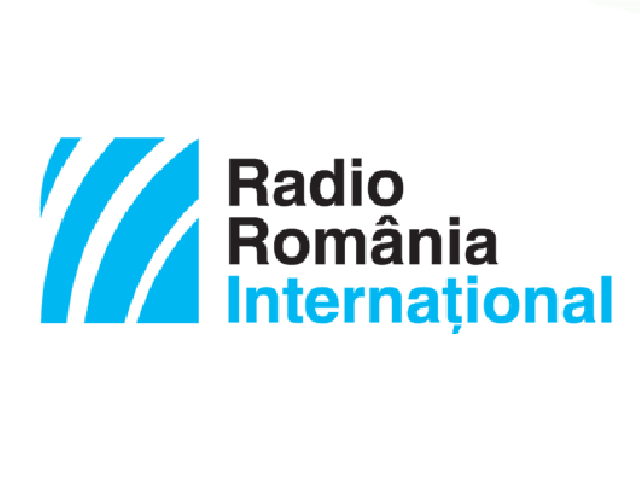
Steven van Groningen is a former professional athlete, a rower in the Netherlands’ Olympic team. He is a representative of the 5th generation of bankers in his family and is married to Valeria Răcilă, an Olympic champion and a member of Romania’s rowing team. He met her in Los Angeles at the 1984 Olympic Games. Since 2002 Steven van Groningen has been the president of Raiffeisen Bank Romania and he has been living in Romania for more than 15 years.
Listen to him now as he shares with us his first impressions about Romania: “I first came to Romania in November 1985, but not as an expat, I was visiting the parents of my fiancée. It was in 1993 that I first came to Romania to work. At the time I worked for one year at the National Bank of Romania and then I worked in a Dutch bank. Ever since I have been living in Romania as an expat. People in Romania are very friendly, openhearted, they speak many foreign languages, they are not reticent to foreigners and this is the most pleasant thing to discover here as an expat. I have lived in other countries too, but the situation was not always as here”.
Steven van Groningen confesses that he learnt the Romanian language easily, being helped by the fact that he studied Romance languages in school and that he is married to a Romanian woman: “I studied Latin in school but back then I never thought I would ever need it in life. I started to learn Romanian on my own in 1984 when I fell in love with a Romanian woman to whom I am married today. This year we will celebrate 30 years of marriage, so I had quite a long time to learn the language, which is not very complicated. What helped me a lot is that the Romanian language is a phonetically spelled language.”
The big passion of Steven van Groningen is photography. He likes to travel a lot and Romania boasts a lot of beautiful places: “I love to travel around the country, as Romania has many beautiful places to visit. I am trying to go to the Danube Delta once a year and to Transylvania several times a year. My wife was born in Bukovina, which is a very, very beautiful region. I would like to travel more but I do not always manage to do that. Bucharest also has many interesting places to visit, from a cultural or an athletic point of view. Expats cannot complain that they don’t have anything to do here in Romania. If we talk about food, I find the local products or the organic products interesting, the good quality foods that are produced locally. I do prefer to cook at home, but if you want to eat out, Bucharest has lots of nice restaurants, like many other cities across Romania. I don’t eat much meat, but here in Romania most dishes have meat, so, if I do eat meat, I prefer to know how the animal was raised, fed and cooked. The region of Bukovina boasts a lot of good food, so I guess it’s better to eat regional dishes than to buy from a Bucharest supermarket.”
Steven van Groningen cannot imagine life without sports, running or competitions: “I run a lot, especially in Herastrau Park, and I also cycle a lot. I have recently covered 110 kms on my bike, but I decided to put the bike in my car and drive up to the outskirts of the city. The roads around Bucharest are good, but drivers are not used to having cyclists in traffic, but that will change in time. I can see that more and more sports events are being held, which is a great thing”.
In 2010 Raiffeisen Bank decided to promote and support the bicycle as a means of transport by launching the program “I love Velo” in partnership with the Green Revolution Association. The program allows the free rental of bicycles by the big corporations in Romania.
(translated by Lacramioara Simion)

Patrick Ouriaghli has a cosmopolitan spirit and he settled in Romania for philanthropic purposes. He is the director of the Association “Workshops without borders” set up by his wife Raluca. Here, marginalized people, people without a home or a job, can benefit from professional re-training by working in several small social enterprises developed as projects by the association. For Patrick Ouriaghli, the decision to live in Romania was both objective, stemming from the wish and possibility to help these people, and subjective, Bucharest being the place where his wife lived and where he was to start a family. That is why adapting to the Romanian society was very easy.
Patrick Ouriaghli: “Adapting to Romania was very easy. The only difficulty for me was the winter weather, as I was born in the south of France. But leaving winter weather aside, the people I met made me feel good at personal level. At professional level, there are many challenges and many things to be done. You always have something to discover and learn, and the project you are involved in is continuously growing. It’s really thrilling. There are few associations and social enterprises that operate in the field of social and professional reinsertion. Our objective is the make those people who are marginalized or excluded or who, for various reasons, are unable to find a normal job in a normal company, active again. After a period of professional training and employment, these people can get hired in a normal company, even a famous one. From this point of view, we are not alone on the market, there another 11 such associations in Romania. Together, we have created a consortium called RISE, the network of social insertion enterprises in Romania. These enterprises have a similar purpose, namely to help those people who are currently considered a burden for the society become active again”.
For instance, one of the projects of the “Workshops without borders” is about recycling advertisement banners and turning them into bags. The bags are made by women in a difficult condition who, in this way, acquire further skills and also obtain a salary until they get hired in a normal company.
Patrick Ouriaghli: “For us, it is very important not to turn our backs on some members of the society who, although today are not able to integrate into a normal company, with a little training and confidence, they can turn into qualified and efficient human resources. In this way people become responsible and no longer depend on the system. These people themselves find it hard to believe that they can improve their social status and become responsible citizens. But it is also our job to help them regain self-confidence. That is why we have developed certain economic activities that both benefit the environment, such as waste recycling projects, and boost social solidarity, such as the projects related to computer donations. We also have this project related to banner recycling called REMASH as well as an organic farm. All these are positive activities and the people involved in them are proud of them. In this way they regain self-confidence”.
Passionate about his activity at the “Workshops without borders” and perfectly integrated into the atmosphere of the capital Bucharest, Patrick Ouriaghli is not going to leave Romania too soon: “I have lived in several countries, my wife has also lived for several years in Paris. But at a certain point we will go either to France or to another country, we do not know for sure now. This is not a clear priority now, at present we are living in Romania and we have a lot to do here”.
The activities at the “Workshops without borders” combine ecological projects with humanitarian ones and the professional insertion actions offer a labor contract for a determined period of time of 24 months, an activity in one of the following fields: recycling, IT maintenance, logistics, packaging, handling of goods, cleaning, transportation, manufacturing as well as customized services such as counseling, guidance, training and mediation, for finding a job, together with NGOs, partner institutions and companies.
When she first came to Romania in 2006 she didn’t find the country attractive. Her children were very small and when they visited Bucharest’s Old Town they discovered it looked like a construction site. Her husband works for the Petrom company and she had to come to Romania quite frequently. When her older daughter went to college, the family decided they could move to Romania, with their younger, 15-year-old daughter having to change school. How did they find the idea of moving to Romania?
Joyce Easton: “We weren’t too worried because we’d visited many times before, so it was a new experience and I think that over the years things had begun to develop a lot, so we were quite excited. We weren’t worried about coming because we knew where we were coming to, and perhaps for my daughter, a new school maybe was the challenge and I worked as a physiotherapist in Scotland so I wasn’t going to be working so that was a bit difficult for me as well.”
But Joyce has adapted and shared with us what she did to occupy her time:
Joyce Easton: “ I have a little dog, when I was by the park, so I enjoy walking him in the park, I have tried to get involved with a few charities, I haven’t recently but before Christmas I was doing volunteering one or two days a week for Casa Sperantei and working with a physiotherapist there, and I tried to be involved a little in the school, if there’s anything happening was the school, my Romanian license..[laughs] I know many words but making sentences of them was a little bit more of a challenge, but my daughter Ioana is trying very hard and I am going to continue until I leave Romania”.
We asked Joyce about her favourite activity in Romania:
Joyce Easton: “Mmm, eating, I love all the restaurants, a big variety, and I also like doing and finding out about the local culture, so I like to go to the markets and once a week to do some shopping for vegetables and things, and also I like to do some cultural things, obviously if there’s an opera, because it’s very affordable here, and in the UK it’s very expensive, and some music things that again, I find Romanians are very cultured people”.
Next Joyce will tell us what she would recommend to a potential visitor to Romania:
Joyce Easton: “I think the countryside is beautiful I haven’t traveled very far north but I’ve been to other places Sinaia, Sibiu, we’ve been skiing in Poiana Brasov, and it’s very different to the city, so it’s a beautiful countryside. There are things that people don’t known if they don’t come to Romania, like the very thriving wine industry which we had an interest in before, so we like to eat out and as I said the culture and historical buildings are great to visit and ballet, opera, music and all things I was interested at home but it was quite expensive, so there’s lots to do for someone visiting.”
Joyce’s daughter has adapted to living in Romania and has found the right activities to dedicate her time to:
Joyce Easton: “She loves the shops, she likes fashion. It’s similar but there’s slightly different things because there’s many developing Romanian designers, things are a little bit more affordable, so she’s quite interested in looking at different small boutique shops that designers are trying to do. And she also enjoys going out with her friends. I think it’s a safe environment for a teenager, I feel, compared to back in the UK, so they have quite a lot of freedom. So she, at 15, 16 is beginning to maybe go out in the evening with her friends until a little bit later, and things. The old city, I think, is a great environment, you see an old lady with her dog sitting having a coffee, there will be young people out, teenagers, families. There never seems to be any trouble. I tend not to go in the city much after 1 or 2 in the morning, but I don’t feel threatened in any way, I use the underground, you know, I am happy to walk around on my own, whereas (I’m from Scotland) I wouldn’t want to be out in the city after maybe ten or eleven o’clock”.
Joyce also referred to several other differences between the Romanian and Scottish cultures.
Joyce Easton: “As an expat I don’t feel threatened at all and I think the other thing when we visited, when the children were younger, at the beginning, simple things like they seem to have quite a lot of respect for older people, there seems to be that culture, people would get up and give up their seat on the underground, which never happened at home.”
Is she were to mention something that she dislikes in Romania, Joyce would say car parking and driving which are real challenges.
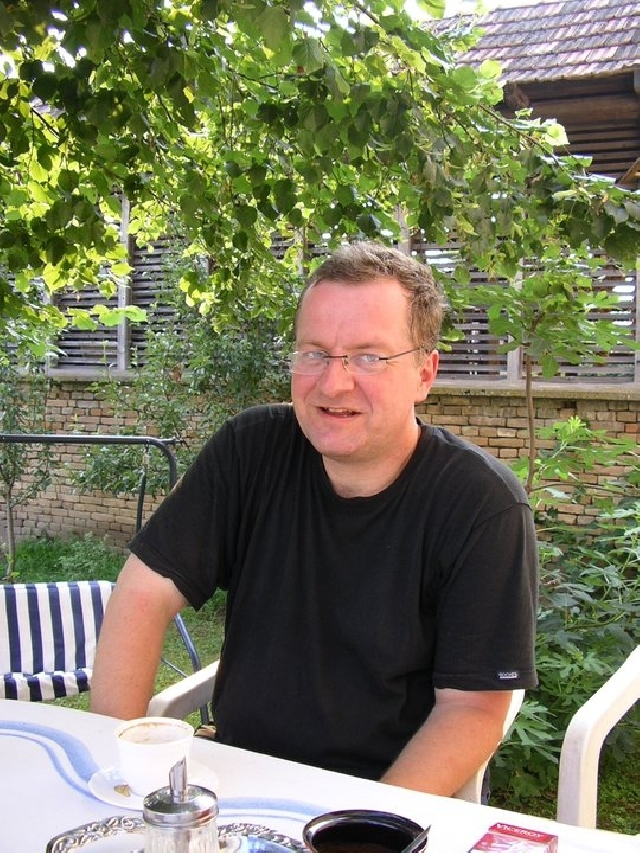
It’s chess that brought Matthias Thesing from northern Germany to Romania. He is actually an international master of that sport of the brain.
Matthias Thesing: ”I came to Romania for the first time in 1986, to take part in a chess tournament and I stayed in touch with the chess players. Then in the spring of 2008, a professor with the Faculty of Letters in Iasi, in the north-east, asked me if I would be interested to see what life was like at the university. I was hired by the Agronomy faculty as an associate lecturer. I taught German to the students who had to study Russian, French, English or German on an optional basis. I also taught classes at the Faculty of Letters for two years, from 2008 to 2010. Then, in the summer of 2010, they decided to cut state employees’ incomes by 25% and that also affected the foreigners who were working in the public sector. That’s how I came to Bucharest. My friends in Iasi were making fun of me, saying I got promoted to the Capital.“
Once he got to Bucharest, Matthias Thessing — who in his country studied Mathematics, Physics and Music — was employed by a private German school for two years. At present, he likes to think of himself as being a freelancer. He’s got teaching jobs in several institutions and also teaches German in private. At the same time, he has never ceased to take part in chess competitions, being signed up by a club in western Romania, “Muncitorul Resita.”
Matthias Thesing: ”To be honest with you, twenty years ago I was a bit envious, as here in Romania chess was not seen as a hobby, but more like a profession. But things have changed in Romania as well. As an international master, it’s hard to make a living only by playing chess. Many have become coaches and they can make money out of that.“
Matthias Thesing says life is not easy at all, yet he likes it in Romania.
Matthias Thesing: ”Salaries are too low. Life is fine, but you need to survive. I do not get money from Germany, like other foreigners who come to Romania. And if you have no choice other than to live on a budget, which you make here in Bucharest, that would only pay your rent and food. But it depends on what you want from life! It’s all clear that, from an economic perspective, conditions in Germany are better. But expenses are also higher there. I said to myself that if here all Romanians manage to survive, why couldn’t I? I like it in Romania, because I feel I’m closer to its culture.”
It’s music Matthias Thesing is interested in the most. He worships the late Romanian traditional music legend Maria Tanase, who was also known as the Charming Bird. He also likes the fiddle songs performed by Romica Puceanu, or traditional music performed by Petreus brothers. He even likes the manele, a musical genre that sprang up in the Rroma communities because, Matthias says, you can put up a fine dance to such tunes.
Matthias Thesing: ”Here’s what I say: Maria Tanase was my first great love in Romania. Time and again, as I graduated from a musical school and because I can also speak Romanian, I am invited as some sort of specialist in Romanian music. I’ve been to a conference in Vienna, I’ve also been to Chisinau, giving half-hour talks on Maria Tanase’s music.”
Yet Matthias Thesing’s musical competence goes beyond that. He has no problem speaking about folk music writer and performer Ada Milea, about Zdob si Zdub, the rock group from the Romanian-speaking Republic of Moldova, the very popular pop music vocalist Inna, about jazz vocalist Teodora Enache, and last but not the least, about the rock music legend group Phoenix, one of Romania’s most beloved rock groups.
For a German, Romania is a somehow exotic country — says Matthias Thesing, who, being attracted to our country, uttered an outright yes as an answer to the question if he had in mind to stay. Until retirement, and even longer!
SOUNDBITE V.M.: ”I have just started negotiations with a high school in Timisoara, in the west, to work there. So it would be easier for me to pay the rent. I hope to get a teaching job with subsidy from Germany, I’ve been dreaming of that all the time!”
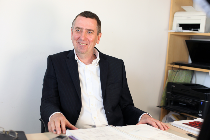
Dean Edgar, un britanic din Manchester, stabilit de 9 ani în România.

Aici puteţi asculta “Expat în România”, ediţia din 4 decembrie 2014, despre Paul Wood, director la Apple Search, un britanic îndrăgostit de România, stabilit la Bucureşti de 16 ani.